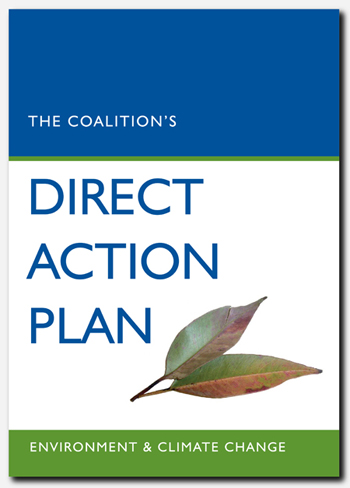The failure of Tony Abbott and Will Hodgman to get their heads around climate change is letting down their party and the electors they represent. [9 August 2011 | Peter Boyer]
 Ask any politician why they’re in the game and they’ll reply that it’s to help people, to work for the public good, or words to that effect. So how does that work when a politician is in opposition, without access to the purse strings?
Ask any politician why they’re in the game and they’ll reply that it’s to help people, to work for the public good, or words to that effect. So how does that work when a politician is in opposition, without access to the purse strings?
Every day in the media we see opposition politicians trying to expose governments’ weak points in the name of greater accountability and transparency. This is important, but they need to do more.
According to the Parliamentary Education Office in Canberra, “the opposition works to provide an alternative to government actions or policies”, and must be ready to govern if that’s what voters decide. The opposition, says the PEO, is “the alternative government”.
It isn’t just voters who decide governments. If the Tasmanian Greens were to ally themselves with the Liberals, or if in the federal parliament just a single MP switched to the conservative coalition, the government in question would change without an election.
Such a prospect throws into sharp relief an opposition’s readiness for office. What should we expect from a national government led by Tony Abbott, or a Tasmanian one under Will Hodgman?
The questions that we now face about climate and energy touch on our entire future — our lives at home and work, what we teach our children, our health and well-being, how we travel, how we grow food, how we make and transport goods, how we relate to nature. In effect, policy to cut carbon emissions and develop sustainable energy is policy for everything.
I’ve been critical of the fumbling efforts of the governments led by Julia Gillard and Lara Giddings to devise and implement climate and energy policies. I’d be remiss if I didn’t apply similar scrutiny to the policies of Abbott and Hodgman, as leaders of alternative governments.
“No tax collection without an election” is Abbott’s cute little jingle summing up his case for the Gillard government to be drummed out of office two years ahead of schedule. Buoyed by anti-carbon tax noise, and with Labor at rock bottom in the polls, he’s going for the jugular.
It’s hard to fathom what this means for climate and energy because most of what we know about the coalition’s policy is what it doesn’t want. Abbott and climate spokesman Greg Hunt have said they’ll abandon a carbon price, including (as Abbott recently said) an emissions trading scheme.
Instead, the coalition has gone for “direct action”. Its 2010 election manifesto declared that it would outlay $3.2 billion to provide incentives to businesses, households and landowners to bring down Australia’s greenhouse emissions by five percent by 2020 (the same target as Labor’s).
Businesses that reduce emissions below a pre-determined “business as usual” level would be able to sell their abatement to the government, while those remaining above it would pay a penalty. There are also incentives for older coal power stations to close or convert to gas.
Rebates for home solar devices, a solar schools and towns program and a geothermal development scheme are some of the coalition’s direct actions. Others are tree-planting, electricity from waste coal gas, energy-efficient buildings, composting and recycling. All good, but can they be funded?
The 2008-09 “pink batts” saga showed that “direct action” measures demand a lot of bureaucratic oversight, yet opposition finance spokesman Joe Hockey has foreshadowed cutting 12,000 public sector jobs under a coalition government, including disbanding of the Climate Change Department. Figure that out.
There is one big-picture item in the opposition climate locker. Abbott and Hunt see “bio-sequestration and the replenishment of soil carbon” as our single biggest opportunity for cutting emissions, which they calculate will reduce as a result by about 85 million tonnes a year.
Some advocates claim soil carbon is measurable and the abatement achievable; others (including CSIRO scientists) say the coalition’s carbon reduction estimates have been greatly exaggerated. The bottom line is that unlike fossil fuel use, quantifying soil carbon sequestration is highly debatable.
What’s needed is information to help us understand how his schemes will work, but Abbott seems congenitally incapable of doing the hard work necessary to build workable public policy. Contrast that with Malcolm Turnbull’s detailed exposition last week of a broadband network policy.
Nor is it easy to work out the Tasmanian opposition’s climate policy. The website of the party’s energy and climate spokesman, Matthew Groom, includes discussion of renewable energy and local, small-scale electricity generation, but mainly in the context of power bills.
On the main Liberal Party website, climate doesn’t rate a stand-alone category. Planning reform, forestry restructuring and cheaper electricity are as close as I could get. Nowhere could I find any reference to a Tasmanian emissions reduction target or the means of getting there.
Opposition scrutiny of government climate policy has been superficial, especially in Canberra where it’s been driven by shallow, short-term political motives represented in three-word slogans. This has devalued the whole policy area and made it easier for governments to fudge things.
In fact, the entire climate-energy policy debate both here and nationally has been debased by the failure of Abbott and Hodgman to get their heads around the physical and economic dimensions of a post-carbon world.
In talking down such things, they’re letting down their parties, their parliaments and their electorates. Their attitude seems wilful, even calculated, and that makes it unforgivable.
